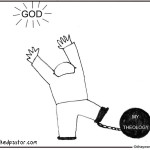We run our website the way we wished the whole internet worked: we provide high quality original content with no ads. We are funded solely by your direct support. Please consider supporting this project.
Book Review: Understanding Spiritual Warfare: Four Views
I just got the pre-release copy of Understanding Spiritual Warfare: Four Views, edited by my friends James Beilby and Paul Eddy (IVP, 2012). The introduction alone is worth the price of the book! It is the clearest, most comprehensive, yet most succinct overview of the concept of spiritual warfare throughout church history that I’ve ever found.
Following the introduction, Walter Wink (with Gareth Higgins and Michael Hardin), David Powlison, myself and C. Peter Wagner (with Rebecca Greenwood) each contribute an essay representing a distinct perspective on spiritual warfare. Each author also offers a response to the other three essays. You probably weren’t aware that Christians held such different views on this topic, and, in fact, until the publication of this book there was no standard way of delineating between these different perspectives. In the course of defending our own distinct perspective, each author was asked to answer three questions: Are Satan, principalities and powers, and demons real? Can Christians be possessed? And, are we supposed to engage with “territorial” powers?
Each of the essays is well written and well argued, and I felt the exchanges were engaging, spirited and respectful. In my opinion, the most “out there” essay was by Wink, who argues that Satan and the principalities and powers don’t exist apart from human social systems. While I firmly dissent from this opinion, I felt that Wink was the only author other than myself who understands the systemic nature of evil that is fueled by these fallen powers. The most intriguing essay, on the other hand, would probably be the one written by Wagner, simply because his illustrative stories are so…well… with all due respect, so very odd. Read it, I think you’ll agree. Curiously enough, there was no essay with which I agreed and disagreed more adamantly than this one. While it was superbly written and well argued, I found Powlison’s essay to be the least biblical and least gripping. Not that he doesn’t have some good things to say, but it frankly struck me as a westernized, almost psychologized, revision of the New Testament’s view of the demonic realm. And my essay…well, I’ll just say that it’s the one I found myself agreeing the most with. Surprise!
If there is a flaw in the book, it could only be that the line between the four “models” at points seemed a little blurry and somewhat contrived. This is a minor flaw, however, and I think it’s a weakness that probably should be expected since, unlike other “Four Views” books, there wasn’t a clear-cut distinction between various schools of thought on spiritual warfare prior to the publication of this book.
If you’re at all interested in spiritual warfare — and if you’re a kingdom person, how could you not be? — I have no doubt that you’ll thoroughly enjoy and benefit from this book.
Blessings,
Greg
Category: General
Tags: Books, Spiritual Warfare, Theology
Related Reading

Modern Theologians and the Centrality of Christ
During the twentieth century the development of a Christocentric reading of the Scriptures—which is crucial to understanding what I argue in Crucifixion of the Warrior God—surged in the wake of Karl Barth’s publication of his Romans commentary in 1916. It was justifiably described as a “bombshell” that fell “on the playground of the theologians,” demolishing…

Hellbound? in the Washington Post
Kevin Miller, the writer/director of “Hellbound?” was featured in the Washington Post in an article titled “Hell is a reality distortion field.” He challenges us to consider that what we believe about hell or anything else is partially conditioned by many things other than just the Bible. This reality distortion field prevents us from considering…

Changing Your Mind
Mark Moore is a man who has changed his mind about a lot of things which is somewhat extraordinary these days. Change can be costly and painful and this was certainly true for Mark. He previously pastored Providence Community Church in Plano, TX, where he pastored for eleven years based upon a set of theological assumptions…

How Jesus Cursed the Curse
People who have committed to following Jesus are called to mimic even this aspect of Jesus’ life. As much as possible, we are to model what creation will look like when God’s Kingdom is fully come. We are to manifest as much as possible God’s original design for creation not only by how we love…

Seeing is Believing Endorsements and Reviews
Endorsements “The imagination is one of the great, untapped capacities of the Christian soul, and imaginative prayer is like diving into the ocean and discovering a world of wonders never before glimpsed or even guessed at. Read Seeing is Believing and discover the great gift from God that you may have been missing.” –Luci Shaw,…


